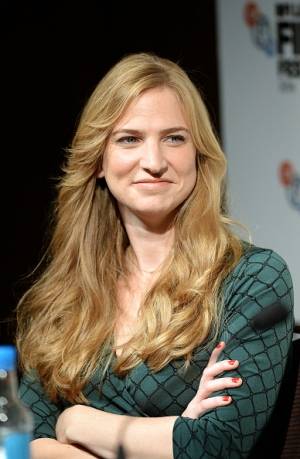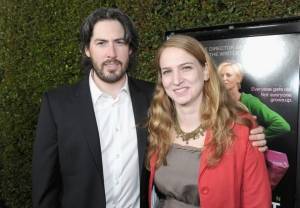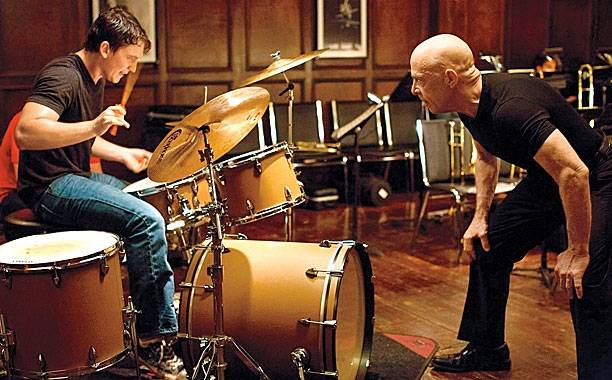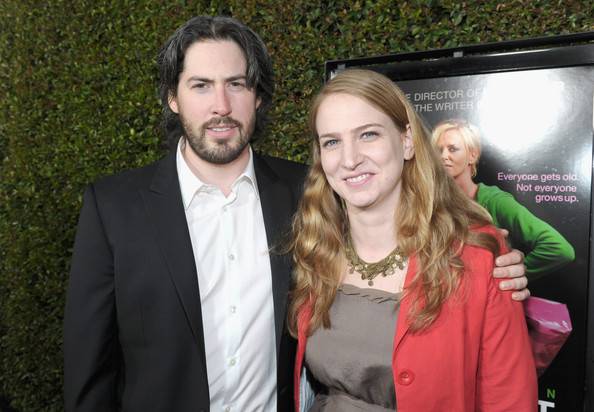If you haven’t yet heard of the film Whiplash, starring Miles Teller and J.K. Simmons, then you have some catching up to do. So let’s start here.
In addition to the incredibly compelling trailer and a list of awards that is pretty mindboggling, this film has something else going for it: a producer who believed in it and shepherded it throughout its development process. That producer, a native of Champaign-Urbana, is Helen Estabrook.
How did she go from a childhood in central Illinois to a career in the movie business, putting together critically-acclaimed films?
I’ll let her tell you. After all, she knows her way around a good story.
———
Smile Politely: In what part of town did you grow up?
Helen Estabrook: In Champaign, near Bottenfield Elementary School (where I went for a few years).
SP: What kind of kid were you, growing up? When you think of growing up here, what are the events that stand out in your mind? (I’m not necessarily suggesting a montage here, but if that idea works….)
 Estabrook: I think I was an odd combination of nerdy and social. I loved books and schoolwork and my friends and playing sports (badly). The main events that stand out in my mind are the plays and musicals I had roles in — The Music Man at the Virginia, The Nutcracker at Krannert, a short play at Parkland (which my father also acted in) — which started at an early age and continued throughout high school.
Estabrook: I think I was an odd combination of nerdy and social. I loved books and schoolwork and my friends and playing sports (badly). The main events that stand out in my mind are the plays and musicals I had roles in — The Music Man at the Virginia, The Nutcracker at Krannert, a short play at Parkland (which my father also acted in) — which started at an early age and continued throughout high school.
SP: From which high school did you graduate? Class of…?
Estabrook: University High School, class of 1999.
SP: And from there you went on to university where? What was your field of study?
Estabrook: I went to Harvard College, and my degree is in sociology. I spent most of my time there doing theater, but after a somewhat humiliating role in the freshman play, I realized that I didn’t want to be an actress — I wanted to be involved in every aspect. I started out stage-managing and got into producing plays from there. Harvard doesn’t have a theater degree, which is one of the reasons I went there; I knew I wanted to do theater but wasn’t sure I wanted to major in it, and most schools that have good theater programs don’t let you dabble as a non-major. I briefly attempted designing a film studies degree (they now have that option but didn’t then) and settled on sociology because it was the closest to my academic interests and didn’t require me to write a thesis, so I had more time to spend doing plays.
SP: Champaign-Urbana has produced people who excel all over the Arts spectrum: musicians, writers, actors, directors…. And, of course, producers. Without asking “How did you wind up producing movies?” (because I’ll get to that), let me ask: What is it about Champaign-Urbana that spawns such an interest in performance and production?
Estabrook: I think it’s a lovely combination — or at least it was for me — of the safety of a small town with the culture of a larger city. There’s the university, of course, but also with places like the Station Theater and other venues, you have a lot of interesting people making interesting things.
SP: Since you did, in fact, wind up producing movies, I should ask what sort of movies sparked your interest as a kid. We all watch entertaining films as children, but was there something that made your really take notice?
Estabrook: There’s a constant joke in my family about my great love for The Muppet Movie as a very small child (starting when I was about three years old) — possibly because it means my love of a story of people (er, Muppets) going to Hollywood to make movies was prescient in some way. I would watch it on repeat and can actually quote a great deal of it to this day because of that time.
Several years later, I started to get into many of the more traditional classics — stemming from my mother’s love of Fred Astaire and my father’s enjoyment of Casablanca. My pre-teen years included reveling the joy of all things Nora Ephron and watching Reality Bites at what was probably too impressionable an age. It wasn’t until college that I started to branch out to stranger and (often) more interesting things, mostly trying to keep up with my classmates’ rather esoteric tastes and became a pure love of all the possibilities in film.
After college, I moved to New York, though even then I sort of knew I would end up in LA, at least for a little while. I was somehow convinced that everyone out west was deeply literate when it came to movies and if I didn’t do my homework, everyone there would laugh at me for not getting their references. I spent a lot of time in the first years after college holed up in my studio apartment watching as many movies as I could get my hands on. It was an eclectic education and involved nights where I would watch four to five movies in a row. (For some reason one collection I remember specifically was Pi, All About My Mother, City of Lost Children, and Dead Man.) I didn’t know it at the time, but I think curling myself up around a tiny TV to do quadruple features was the best preparation I could have for attending film festivals. (I should note that during one of my first interviews in LA, I was asked what my favorite movie was. I rattled off a list of wonderful but admittedly pretentious titles. The woman interviewing me, an executive at a company known for its commercial fare, responded, “Um, okay. What movie have you seen the most?” So after all my “studying”, I was back to The Muppet Movie.)
SP: Now we’ve arrived at it: What was the confluence of events that led to you producing a movie? And could you give the readers an idea of what is involved in producing? It’s a more…amorphous concept, perhaps, than acting or directing. (And I doubt Mamet’s films, for instance, get it quite right.)
 Estabrook: I basically started as an assistant and worked my way up through development (basically, giving notes on scripts and identifying new material). It’s not often that straightforward, but I was very lucky.
Estabrook: I basically started as an assistant and worked my way up through development (basically, giving notes on scripts and identifying new material). It’s not often that straightforward, but I was very lucky.
Producing means different things to different people, and there are several different types of producers, so it’s understandably a bit confusing. I’m often called the “creative producer,” and I see my job as being the person who builds the project from the ground up, doing everything within my power to make it the best it can be.
SP: What do you look for in a film? One can’t help but notice that your list of projects is pretty top-heavy with quality. Is it a matter of trusting the writers and directors you’ve worked with before, the relationships you’ve developed?
SP: Beyond the basic need for good and interesting characters, the main thing I look for in a film is something I haven’t seen before — some element or exploration of an idea that feels new and different. Simultaneously, I look for things that feel honest and ring true. I guess, ideally, it’s finding something that has that special combination of completely new and yet somehow still familiar.
SP: In your opinion, where does producing fall between Art and Commerce?
Estabrook: For me, it depends on the day.
SP: Here’s an easy, cheesy one. When was the last time you were starstruck, or are you impervious to that?
Estabrook: Last year, I had the pleasure of meeting Emma Thompson when she came in to do some voiceover work for us. She’s stunningly beautiful and incredibly witty. She would be frightfully intimidating if she didn’t also seem like she’d be the most fun drinking buddy in the world.

SP: I haven’t asked you specifically about any of the films you’ve produced, although I’m a fan of many of them. Young Adult, for instance, is brilliant, and it’s a truth pretty much universally recognized that Up in the Air is great. One of your recent productions, Whiplash, looks amazing. What would you like Smile Politely readers to know about it?
Estabrook: Whiplash is opening in Champaign this weekend at the (truly wonderful) Art Theater. It was the first fully independent film I ever made — meaning, throughout the making of it, we didn’t have distribution, so there was always a chance we would do all this work and no one would ever see the final product. It is also a more personal movie for me than many of the others, which is perhaps a strange thing to say given that it’s a film about a jazz drummer and his abusive teacher.
We knew it would be difficult to get it financed, so we took a scene from the feature script and made a short film version as a proof of concept. I took that short film around town to raise the financing to make the feature, which we did in September of 2013. We only had nineteen days to shoot it (as a point of reference, I had never shot a movie in under thirty days previously), and then we had very little time to get it ready to premiere at Sundance. We had an incredible team who miraculously pulled it all off, and I honestly could not be prouder of this film.
———
Whiplash does, in fact, open December 19th at The Art Theater Co-op, and Ms. Estabrook will be in attendance next Tuesday, December 23rd, for a Q&A following the screening. If you’re able, get out and support this film and the people who made it. It’s the perfect opportunity to see how well some stories turn out.








